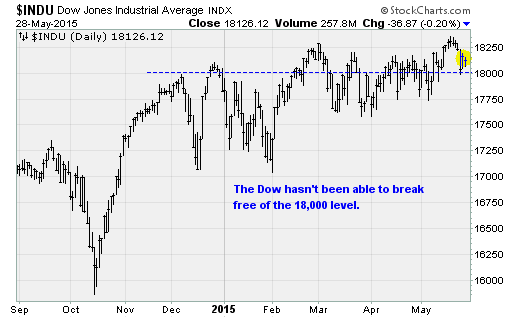What's keeping stocks stuck in the slow lane
I don't know how else to say this: The American stock market is boring. At least, it is right now.
After the scary Ebola-driven up-and-down back in October, the Dow Jones industrial average hasn't been able to really break free of the magnetic pull of the 18,000 level. On Thursday, the index closed near levels first hit in late December. It's been five months of listlessness.
Compare that to the action in China, where the Shanghai Composite is in the midst of an epic bubble. Prices dropped 6.5 percent on Thursday on signs of froth, but they're up some 70 percent since early December. Germany's DAX is up about 20 percent over the same period. Japan's Nikkei is up about 17 percent.
The tech-heavy Nasdaq Composite has put in a better performance, rising earlier in the year before stalling out in late February -- sliding sideways ever since.
Investors have grown apathetic. In late April the three-week average of neutral respondents to the American Association of Individual Investors' sentiment survey reached the highest level since 1989.
According to the team at SentimenTrader, this is coming at a time when the stock market's uptrend has pretty much been on cruise control: Trend persistence over the one-, three-, and five-year time frames is as high as any time in history. The last occurrence was in 2007. Market returns tend to be poor following such periods of easy gains, according to SentimenTrader's market history data.
A number of potential catalysts are weighing on the bulls.
The specter of interest rate hikes from the Federal Reserve sometime this year -- ending the zero-interest rate policy going back to 2008 -- is the primary concern. Fed Chair Janet Yellen hasn't soothed nerves either, recently warning that her institution is on track for rate hikes this year and that equity market valuations are "quite high."
Movements in commodities, currencies and bonds have been troublesome as well.
Crude oil looks set for further weakness as Saudi Arabia and U.S. shale producers boost production in the wake of the rebound in energy prices over the past few months.
The rising likelihood of a policy mistake in Greece -- which is continuing bailout negotiations with the European establishment -- could worsen the drag on energy via a stronger dollar. Deutsche Bank analysts put the odds of a Greek default following its June 5 deadline to make a $1.8 billion debt payment to the International Monetary Fund at 70 percent.
Falling energy prices pushed stock prices lower earlier in the year as energy sector earnings took a hit. A strong dollar has been a negative influence on overall corporate earnings because it reduces the value of foreign profits earned by U.S. multinationals.
And while the Fed remains on hold, long-term Treasury bonds weakened noticeably in late April through the middle of May. That lifted yields, pushing the 10-year Treasury rate from 1.9 percent toward 2.3 percent. A combination of higher inflation expectations and higher GDP growth forecasts were the motivators -- both of which could post a resurgence should the Fed hold off on its rate hike plans until early 2016, which the futures market increasingly expects.
Finally, valuations are demanding at current levels. Analysts at Bank of America Merrill Lynch admitted in a recent note to clients that stocks are clearly expensive -- although this tends to matter more when considering long-term returns rather than trying to make short-term calls on the direction of stocks. Their calculations suggest a median annualized return for the S&P 500 of about 8 percent over the next 10 years compared to the 50-year average return of 10 percent.
With stocks entering the summertime lull, when trading volumes dwindle and market history suggests returns will be hard to come by ("Sell in May" and all that), the doldrums look set to last for a few more months, at least, unless Athens decides it has had enough of the euro.

